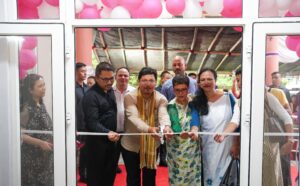 Shillong, Oct 1: To delve on the biological, medical, social and psychological aspects of “aging phenomena,” the North Eastern Hill University (NEHU) is for the first time organizing the “International Symposium on Aging (ISOA-2012) and “16th Biennial Conference of Association of Gerontology (India)” on the theme – “Problems and prospects of elderly in today’s world” which kick started Monday.
Shillong, Oct 1: To delve on the biological, medical, social and psychological aspects of “aging phenomena,” the North Eastern Hill University (NEHU) is for the first time organizing the “International Symposium on Aging (ISOA-2012) and “16th Biennial Conference of Association of Gerontology (India)” on the theme – “Problems and prospects of elderly in today’s world” which kick started Monday.
Coinciding with the World Elderly Day, the three-day programme organized by the Department of Biochemistry of NEHU and Association of Gerontology will see participation by eminent and renowned personalities in the field from across the country and outside including Japan, Germany, USA and Hungary.
“The symposium will cover the biological, medical, social and psychological aspects of “aging” phenomena,” NEHU Vice Chancellor Prof AN Rai said while addressing the inaugural function here.
Stating that aging has been a global concern of every society, he said, “This concerted approach to look into the problems of the aged holistically will be more rewarding and provide a multi-disciplinary platform to address the issue of elderly.”
“Participation from several countries besides our own will enrich the symposium which coincides with the day of the elderly,” Prof Rai added.
Prof Zolt Radak of Semmelweis University, Budapest, Hungary gave a brief presentation on the topic – “The effects of regular exercise to aging brain” where he revealed that “In the last decade, it became clear that regular exercise beneficially affects brain function as well, and can play an important preventive and therapeutic role in stroke, Alzheimer, and Parkinson diseases.”
“The effects of exercise appear to be very complex and could include neurogenesis via neurotrophic factors, increased capillarization, decreased oxidative damage, and increased proteolytic degradation by proteasome and neprilysin,” he said.
According to him, Data from our and other laboratories indicate that exercise-induced modulation of reactive oxygen species (ROS) levels plays a role in the protein content and expression of brain-derived neurotrophic factor, resulting in better function and increased neurogenesis.
“It appears that exercise-induced modulation of the redox state is an important means by which exercise benefits brain function, increases the resistance against oxidative stress, facilitates recovery from oxidative stress and attenuate age-associated decline in cognition,” Prof Radak said. – By Our Reporter






















+ There are no comments
Add yours